“No one can live this life and emerge unchanged. They will carry, however faint, the imprint of the desert, the brand which marks the nomad.”
Sir William Thesiger, Arabian Sands, 1959
“I WOULD like to live in a cabin in the woods,” the modern social media scroller thinks to himself; re-tweeting and re-stacking and commenting again and again, expressing the kinds of ideas that have, for millenia, driven men to rush out onto the fringes. Again and again we see these kinds of sentiments circulating about the digital atmosphere, and always, without fail, the algorithms seem to adore this kind of “content.” From “cottagecore” Pinterest boards to memetic lyrical odes to “Uncle Ted” and Alexander Supertramp and many viral posts about leaving “the 4HL” to “live on a farm,” romantic fantasies about “dropping out of society” are now a classical, timeless genre of online whimsy.
I call it “whimsy,” of course, because for all my life, I have approached this particular subject in a strictly practical kind of sense: and indeed, most of those espousing some sort of a desire to “drop out” will not be doing so anytime soon. In fact, quite a few of the same who would hit “like” on a post about absconding into the forests of Alaska or Arizona or Patagonia to get away from the harsh sorrows of society may, in actual fact, actively scorn those who really have dropped out of society.
There is a strong and delirious kind of irony to this — the one who dreams of exiting the cubicle in favor of a self-sufficient cabin homestead in the wilderness or a life of endless wandering is quite often the very same one who says “get a job!” to his hippy-dippy cousins and friends. Or, in assessing the lives of actual drop-outs, he may offer so many warnings and curses and doubts, and exhibit a strong leeriness about their aims and methods. Far better to stay on track, he reasons; to take the job, pay the bills, and, when the workday is over — to scroll through images of beautiful cabins and desert shanties or to read stories about society’s marginal refuseniks from the comfort of one’s air-conditioned home. The urge to drop out must be confined to the domain of whimsy, or of vicarious imagination, or even to parasocial relationships with the digital hoboes of Youtube or the resident burnouts of X; nothing more.
But what of those for whom these kinds of ideas are not mere whimsy? What of those whose yearning for some sort of “exit” from “normiedom” is earnest, serious — even dire?


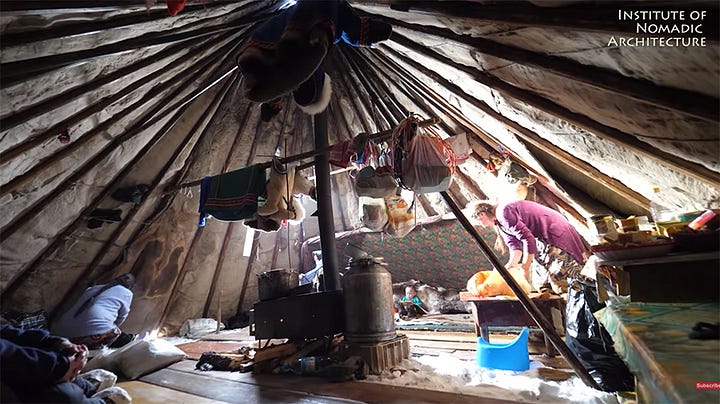

Such people seem to have a way of reaching out to me with their queries, and for good reason. Online and off, I have accidentally become known as a kind of “dropout par excellence,” and this has not happened without good reason — I have exactly the résumé and the expertise for the job. If there is anything I can uncomplicatedly speak with authority on, it is this.
These would-be wanderers, idlers, bohemians and vagrants have sent me requests for information with such intense frequency that I realize it might be wise to compose a sort of “master guide” to the thing. Rather than repeating myself time and again in private messages and calls, why not open this information up to the public?
For most, reading an essay like this will only be a kind of interesting foray into a curious, alien, and often gritty world they do not live in. Or it will feed the forbidden fantasies of those who might admit they are poorly adjusted to “the 4HL,” tempting them to contemplate a life that they very well may never go out and live. For the rest, it is my hope that what I write here will serve them well in their inevitable march outward and away from the burdensome strictures of life as an upright worker-consumer-citizen. Whichever demographic you fit into, I hope above all that what I have written here will serve as a reminder to you that there are many, many ways to live, no matter who you are — and that if the grave pressures of one mode of living might really become too great a weight to carry, there are always other options.
Or — in the memetic parlance of today’s digital youth: “Never kill yourself.” For some of us, this dictum is so easy to honor and live by that we do not think about it at all. But in the world we now live in, there are others for whom avoiding suicide is a full-time job.
This article is first and foremost for them.
There's many that feign enjoyment
From merciless employment
Their ambition was this deployment
From the minute they left the school
And they save and scrape and ponder
While the rest go out and squander
See the world and rove and wander
And are happier as a rule
A.M. Stewart, “Ramblin’ Rover,” 1982
On many occasions, I’ve had the pleasure of visiting America’s most isolated southwestern deserts, where I’ve occasionally seen signs that say something like this: “WARNING: Proceed at your own risk. There are NO services in this area; rescue may be difficult.” To proceed anyway is to take your life into your own hands. During the times I’ve chosen to do so, life has felt a great deal more “real” in such desolate places, for the consequences of one’s actions there are not so insignificant as they are in more civilized quarters. The one who enters these deserts enters into a wild domain without backup, without safety nets, where a fellow’s survival and safe return are purely his own responsibility.
The one who has wrested himself from the norms, duties, and expectations of the society into which he was born finds himself in a similarly hazardous domain. Without credit or regular income, without ID, often enough without money or fixed address — living a life that certainly will render him totally illegible to his fellow countrymen: the regular suite of protections, securities, and luxuries that are afforded to those who hold up their end of “the social contract” may not be afforded to him. If they are, they may come only as the most skeletal iteration of them — he may be hustled out of emergency rooms in half-taped bandages, laughed out of banks, ignored by police (more often: chased by them), and his friends, family, and potential employers will regard his bizarre and outlandish trevails with profound skepticism. At times, his history of “dropping out” — however long ago it was — will be viewed as a crime requiring continual punishment, with ample “I-told-you-so’s” distributed at every chance, even from his closest associates.
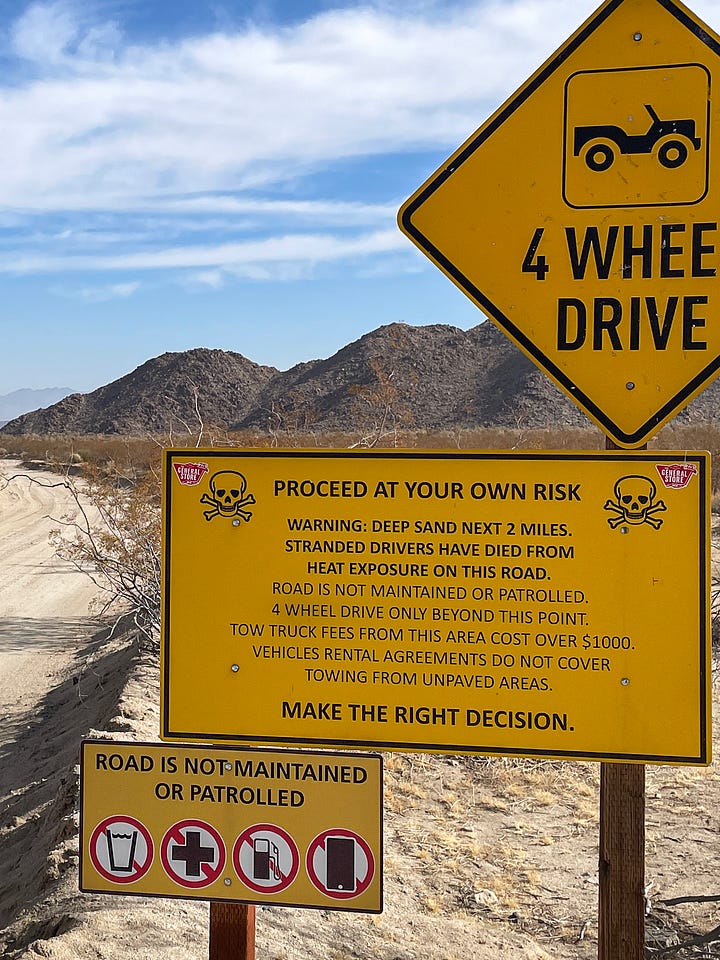
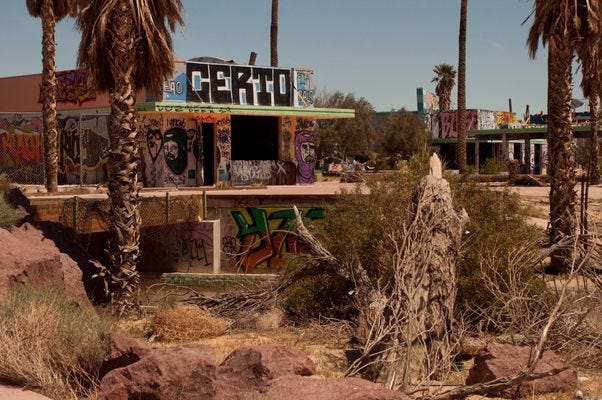
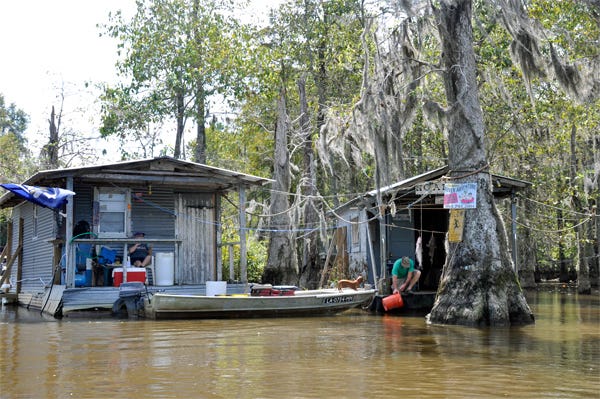
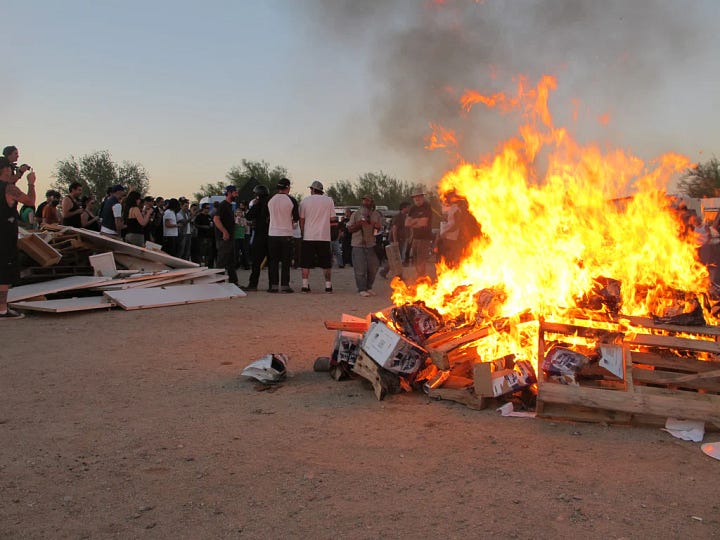
Moreover, the longer an individual might choose to stray from the regular structure of an upstanding life — the longer it will haunt him in the future should he ever choose to reintegrate. Giant, gaping “résumé gaps” will have to be explained if he should seek to find normal employment; often he’ll be passed over even if the explanation is quite good. The absence of credit bars him from seeking a car loan or a mortgage until he has played the “credit game” for at least a year or probably more. Obtaining ID can be profoundly difficult for those without any — particularly in cases where vital documents like birth certificates and Social Security cards have been lost or, in the case of those with a flair for drama, deliberately destroyed. Without rental history, apartments are hard to come by, and the sorts of places one can rent without any history or references are often pricier, seedier, or both.
And the health and social consequences may also be serious. After so many years of sleeping on the hard ground, my back muscles and vertebrae show levels of distress generally seen in men twenty years older than I am. The overnight vigilance of such sleep can cause lifelong difficulties; one may find it hard to sleep indoors for a time, or may find it impossible to avoid sleeping with one eye open. Nutritional deficiencies, alcohol and drug use, violence, or exposure to harsh elements can cause further lifelong physical and psycholgical pain. Finally, in veering off the normal course of life in society for so many years — one’s friends and family may forever regard you with suspicion, or may consider you to be insane. Occasionally, they won’t be too far off the mark, for your habits may have unwittingly devolved into a primitive or even semi-criminal state; and in the event you’ve witnessed horrifying scenes on society’s darkest margins — your nerves may quite rightfully be a little jumpy for the rest of your life.
These are the warning signs the dropout faces before he has even taken the first step; they are not the kinds of things spoken of or celebrated by poets and romantics and the sorts of vagabonds and hippies with a penchant for “getting high on their own supply.” The depictions of life “outside society” they peddle are generally incomplete, and often exclude the hazards. While there is a great deal of romantical, high-flying poetry in the mountain man’s ascent to solitude, or in the hobo’s flight across the steel rails of America — it is not nearly as popular to describe how morbidly difficult it can be to re-enter polite society, nor of how these difficulties can “trap a man outside” forever. I say this as one who has failed to re-integrate completely or even substantially. Even the military could not succeed in doing that for me — I am simply too habituated to life on the edges of the wider world. Without clocks, with little money, hidden in obscure hinterlands, master of one’s own time: once you have tasted of this, it can be nigh impossible to turn away from it later.
Indeed, dropping out of society is a thing that comes in an unmarked tin, without a warning label or any disclosure of what it contains. Usually, those who endeavor to do it only faintly understand the risks, or know nothing of them whatsoever, but in our case here, I believe it is my duty to quite plainly state to the reader that all manner of difficulty can result from the decision to drop out. What I have listed so far is by no means an exhaustive account; it is only a brief run-down of some of the ways that this life will tattoo you, mark you forever, and leave you totally altered in the end.
But, if in approaching and weighing these likely outcomes and costs, one finds that their enthusiasm for departure from the life of a respectable citizen has not diminished or evaporated entirely, or even that their desire for an exit has increased because of it, then go and do not hesitate. You will step into another world, you will march into an alien land. You will be branded, marked, and you will either bear that mark as a curse — or you will sing its song confidently, forever. If you are to take this first step, understand that as you slough off the burdens of respectability and the reputable citizen’s duties, your new burden will be to wear that mark gracefully. If you cannot, it very well may destroy you in the end, with every measure of isolation imaginable.
So — proceed at your own risk.
"I hate luxury. I exercise moderation…It will be easy to forget your vision and purpose once you have fine clothes, fast horses and beautiful women. [In which case], you will be no better than a slave, and you will surely lose everything."
~ Genghis Khan
After noting the warnings, one of the first and most crucial realizations one must face in making their exit is this: a human being has shockingly few needs. Any student of anthropology could affirm this axiom, at least in the abstract — for a brief glance at the primordial hunter-gatherer origins of mankind would tell the whole tale. A flint knife and a leather pouch; a shanty of thatched reeds and bent saplings — a spot of meat by the fire each day, and cool creekwater to drink from a leaky bladder of goatskin. To walk and to breathe; to pray and to convene with the others — to sit in the profoundest idleness high in the unconquerable and wild hinterlands… these are a man’s simplest needs, and their simplicity is physiologically universal to human beings everywhere. It is only in cases where the habits of any populous have led people to insist upon princely fineries that anyone is tempted to think differently; but the societal dropout cannot afford such luxury, and in fact, he lives to prove that the primitive simplicity of auld has never died entirely.
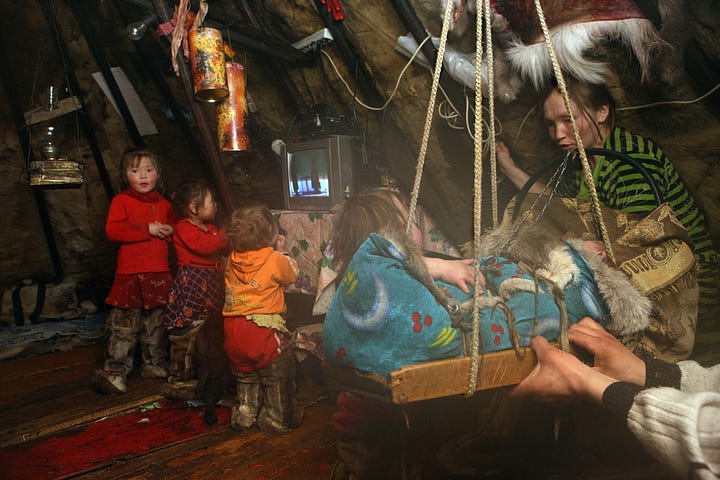
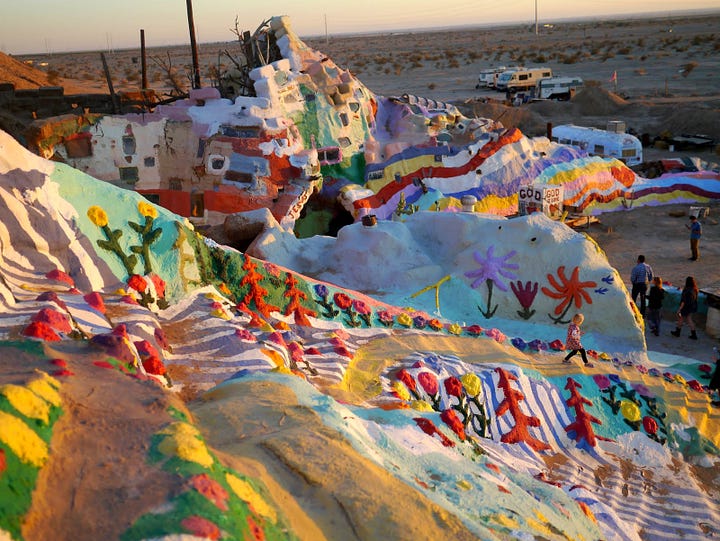
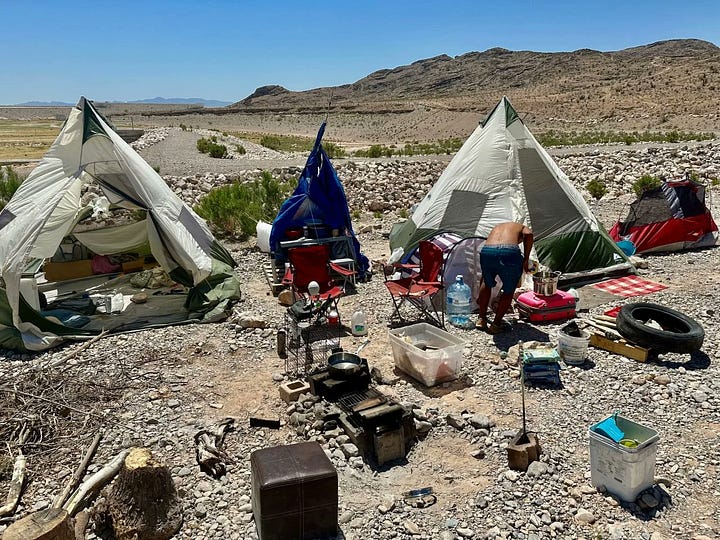
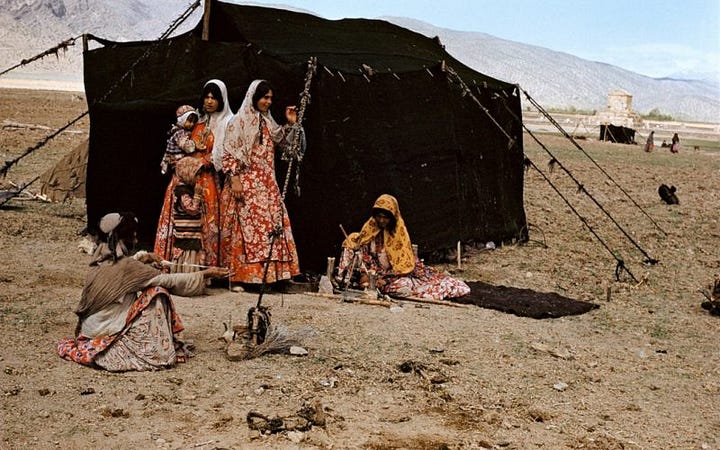
He should not want such luxuries even if they came to him for free. For luxury controls a man, and indeed, it controls a people. Of the one who punches his clock and dutifully pays his bills today, what can we say but this? He must earn because he must pay his bills; and he must earn richly, for his bills command a sizable monthly fortune. And to earn, he must work, selling not merely his time but his fealty for the sake of whatever money procures for him.
What does he do with his money? Only rarely does he employ it toward some kind of a sublime and high-minded end — only very occasionally is the working-man taken with purchasing fine ivories and soapstones to carve, or to taking Greenlandic sabbaticals, or to collecting rare Vedas or medieval tomes… to the contrary, his money is squandered on the various luxuries to which he is addicted, all of which are of startlingly recent marque and invention; he is a machine-man, surrounded by machines. Televisions and washing-machines, automobiles and tickets on flying jets; trips to the stadiums and to high-dollar bars and clubs — ATV’s, Disneyland vacations, cigarettes and candies, expensive hotel rooms with sprawling staffs who fluff his pillows before he has even arrived… it is for this feverishly novel manner of living that he labors, and it is this that drives his incredible fear of unemployment.
We, on the outside, must never judge him for what he does; not at all. This is crucial to remember. It is natural that, in the course of human life, some median would be constructed, providing a large degree of comfort to those who submit themselves to the greater good, or to productivity, or to the protective authority of the state. Quite frankly, it is an excellent bargain unless one is patently indisposed to the sort of activity it requires (as the dropout is, by nature, liable to be).
Therefore, it is important to remember that we, the dropouts, are the ones with the handicap — not the others. Tempting though it may be to indulge the idea that we are, for our intrepid ventures outside the august limits of the upright life, somehow superior to them, the opposite is true. Homage must be paid to the ones who dutifully work and live lives of great toil and comfort, for they build the world and grow the food that sustains our life. And in the end, our status as outsiders on the far bleeding edge of society is meaningless if we cannot occasionally return to the settled world to bring such people some kind of sublimity or inspiration; we must harvest the strange crops that can only be harvested in the desolate places, that we might bring something edifying and life-giving to the bricklayers and paper-pushers, who are often tottering on the edge and in great need of tasting something of all we have seen…
Of course I am now neck-deep in a digression. To get back to the point — to walk away from society is to voluntarily banish oneself from the comfortable life, and to take up the Spartan mantle. It is, at least by default and from the first of it, to choose to sleep in ditches rather than on feather beds; it is to drink water rather than expensive gin and porter. Food from the grocer’s dumpster — unelectrified cabins, bicycles instead of cars. It is to become a feverishly cheap sort of man; a master of “Woodchuck Economics.”
Woodchuck Economics
It’s a known fact that work sucks. I don’t particularly care what you’re doing for a living, if it hasn’t gotten old yet — it will. Or so I am told by many retired elderly men. Of course, the term ‘work’ itself seems to have to do a great deal of work of its own. It’s a tired term, used a half-dozen different ways or more. A journalist ‘works his angle’…
Only if a fellow can make certain that he is able to tolerate the sorts of “indignities” inherent to the frugal life (which are, for the record, already a thousand times more luxurious than all that our hunter-gatherer forebears subsisted upon) can he be sure-footed in his journey outside the pale of society at large. And so it is that before one endeavors to make their flight into their long self-exile at the margins — they must take care to slash away every conceivable monthly bill, even at the cost of comfort; to take great care to ensure that one can support themselves on sums of money so paltry they can be obtained practically anywhere and with famously minimal effort.
With this achieved, the prerequisites for one’s exit from “society” have been fulfilled — and the journey can begin in earnest. For what does one need now? Sixty-three cubic feet of space in which to pass each night of sleep; preferably non-freezing, secure, and free of any environmental hazards to health, for the first. Then, what else but a few measures of rice and beans, lentils and discount chicken, a bag of oranges now and again, clean water, perhaps a spot of tea and a plug of tobacco — a pair of shoes, a set of clothing, and some means of transportation.
The very simplest and most minimal dollar figure such a life could cost would be as paltry as a few dollars each month — perhaps even less than $100, if indeed our dropout had a simple tarp, a pair of boots, a rucksack, and a willingness to harvest the great bulk of his calories from the grocery store dumpsters… Heaven knows that I have lived this exact kind of life before, walking and hitchhiking, stealthily sleeping wherever I was well enough out of sight, eating whatever I could find — and indeed, long, sprawling seasons have passed in my life during which I spent nothing, earned nothing, stole nothing, and received not a single handout. I was only a vagabond and a scavenger; harmless as they come, and though it may seem unlikely to imagine from ‘more comfortable’ vistas — I count such periods among the happiest days of my life, for I was purely my own man.
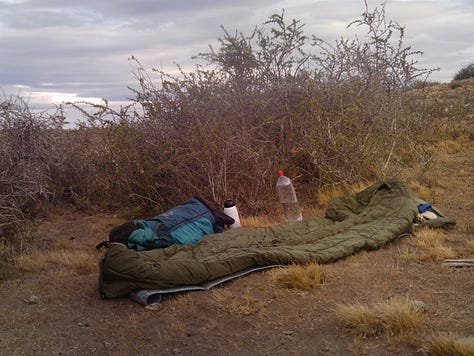
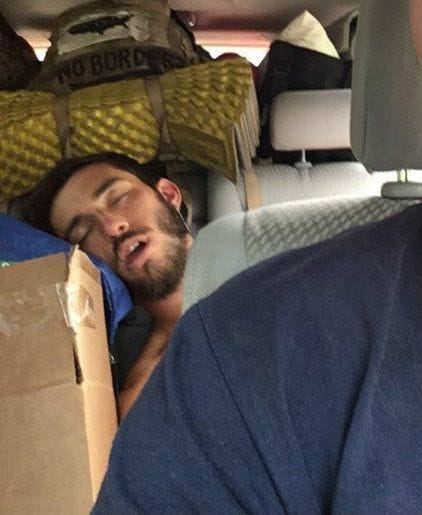
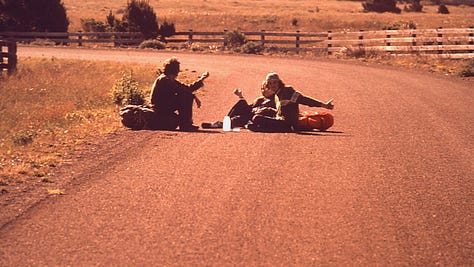
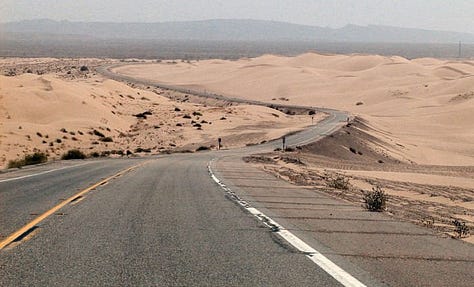
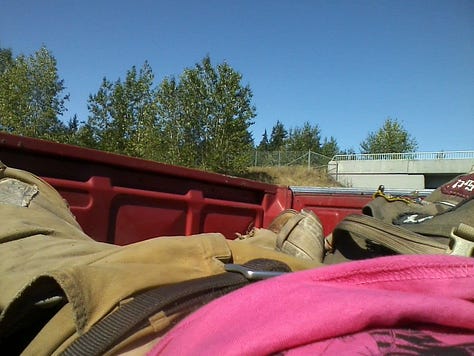

Ever since, I have considered this exact configuration to be a thing I call the default state of man. For though I descended to such a state purely by my own choice, my years of “slumming it” had a great deal in common with the lives of primordial hunter-gatherers, refugees of great disasters and wars, castaways and orphans, criminals on the lam and ruined men of every type and flavor… My manner of living then was indeed the “lowest” a fellow could go, but I nonetheless found myself smiling with contentment during those times, to my great amusement and gladness. With years like these under my belt, the question of “survival” ceased to trouble me; I lost my fear of “losing everything” and “starting from the bottom.” In fact, I nearly pined for it, and still do — because those living such a life have a near-constant stream of wonderful puzzles to solve each day, and what a thrill it can be to solve them.
In fact, one hitchhiking ride I received years ago in Nebraska offered me a humorous bit of wisdom about my condition. The man was a stock broker on Wall Street; he’d decided to take a long, solitary road trip after a nasty divorce. He said: “You’d make a great stock broker, you know that?” Naturally, astonished at his strange remark, I asked him why. The reply: “Because you’re living at the bottom already and you seem to enjoy it… On the trading floor, you’d have no fear of failure; you wouldn’t get shaky hands on big, risky trades. And for that, you’d outperform practically everyone — because they’ve got bills to pay! They are worried!”
I certainly couldn’t argue with that — for he was entirely correct. Traveling to the “very bottom” of things, and operating in conditions of such radical scarcity that one nearly forgets the comforts of warm beds and locked doors and hot breakfast buns and high-end cocktails — it is an education. Unwittingly, I achieved the highest ideal of what a “dropout” might set out to achieve; and in so doing, I constructed a wonderfully solid foundation on which to experiment, improve, and build all sorts of things. Even as I sit here typing this at my Adirondack estate, I remember it — and if the day would come where this place would burn down, or be repossessed, or whatever else; why, I would only smile, and revert to the life that I gave so much of my youth to, for however long it took.
Now of course, an ideal is only an ideal. Like surfing a great wave, or seating oneself perilously upon a stone in the center of a raging river — it is a wondrous thing to behold, but it cannot last. It is educational, and demonstrative of some enlightening principle or another — but you very likely cannot stay there forever unless you are some rare, heroic, mystic of a man. For while the fellow who lives in vagabondish abjection really has succeeded in exiting society almost entirely, his heart, his aching body, and the sands of time are likely to altogether conspire to drag him back to another reality entirely.
I say this because as I went, my body broke down slowly. A grave weight hung down on my heart after so long, too, and I took to tippling more than I should’ve. More than any of this — I was lonely, and quite wished to find myself not only in the company of a tribe of like-minded compatriots, but in the company of a woman. In short, it became clear that I — like the vast, vast majority of vagabonds who have ever walked the earth — could not continue with this kind of life, not without making some major adjustments. I would have to take what I’d learned up to then and build up on it for some higher purpose. Nevertheless, I was glad to have lived it, and though I dreaded living another way, and kicked and screamed the whole way to the next chapter — now, I stand in a position all the firmer for what I learned living that way.
And so I implore the would-be dropout to begin with a chapter wherein they experiment with the default state of man. Go and dive headlong to the bottom; see what is there — realize that if life’s stakes have ever seemed high, such heights have only been a kind of mental vertigo and little else; once you have ventured down to the “worst off you could possibly be” — if you go in with jolly spirits and a keenness for solving life’s little problems — you’ll see that it is not so bad, and will walk with a great sense of security forever after.
This is, to my mind, the greatest education one can receive; it brings a peace of mind that few living men now enjoy, and those in possession of it will flourish, even at the furthest extremities of mankind’s footprint upon the earth and in any crisis whatsoever. And let us remember that life “outside society” is ultimately a life of crisis — those who choose it will need to be armed with a profound and smiling comfort with the “bottom of the bottom” now and again.
Worthwhile as it may be to descend to this “default state of man,” there are a host of reasons why it cannot be a sustainable long-term way of life for the great majority of people. Instead, after so long of dwelling there, it becomes clear that a discerning fellow has a God-given ability and need to build and do and create that must be exercised… more than this, he is also built to love, and may pine for a family, or for a piece of soil to call his own, or for a mode of nomadic travel that is more sustainable long-term — and more readily able to sustain the needs of a family or tribe.
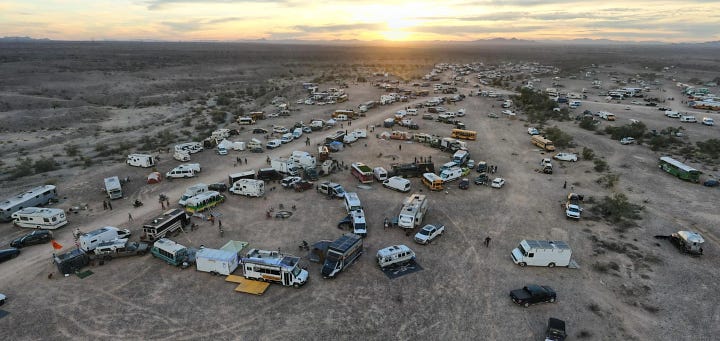
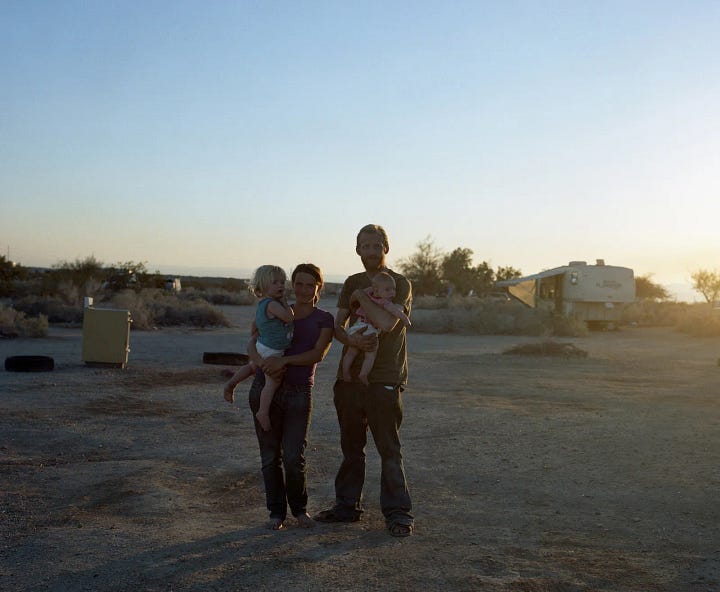

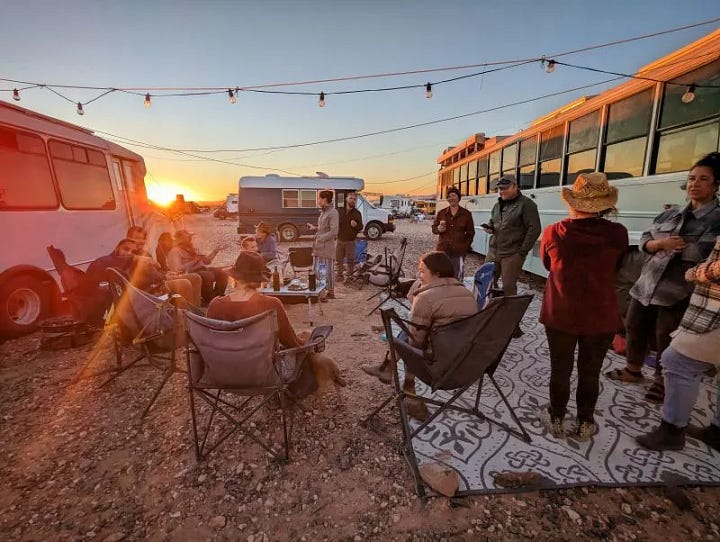
It is only now that one might arrive at their “cabin in the woods,” or to their sailboats, buses, vannagons, or bender tents. Herds of goats high in the public steppelands — riverboats on the Monongahela, isolated tracts of wilderness in places like Alaska or Nevada or Maine. To take a wife and head for the hills; to raise home-birthed, home-schooled, no-social-security-number babies out in the desert wastes — these notions might actually come to fruition here.
A single essay cannot address all of the possibilities; even a book-length work would struggle to do so. There are as many ways of living, frankly, as there are human souls on earth. Each one will have a different set of aims and ambitions — but it may be useful here to establish two sets of general principles that could aid in the decision-making process a given ‘dropout’ will employ.
For the first, one must know themselves rather well; they must take the time to study their own proclivities. Some will already know them quite well — others may need years of wandering to discern the general ‘shape’ of what their life ought to look like. Others will never find out but must try anyway.
For example: Are you a ‘naturally nomadic’ sort of person? Does restlessness come up and bite you when you remain stationary for months or years on end? If so — accept it, do not squirm beneath this basic reality, nor should you be tempted to imagine that such a nature comprises a flaw or a glitch in your own nature (lest you try and fail at settling, again and again, as many have done before). After all, human beings are a nomadic species, by the by, and though settled societies may’ve sought for millenia to eradicate, harrangue, hassle, and generally banish nomadic peoples to the furthest edges of the earth or even into extinction — such a life is still amply possible. So far as I know it, the modern vagabond’s nightly, whiplash-inducing randomness cannot be sustained with a family; but a modified, seasonal, rhythmic pattern of movement can. Study traditional nomadic peoples; learn what you can of their ways, and adopt their way of life as a workable ‘baseline.’
Or — if you are a sedentary sort, you must contend with the reality that settled people have a profoundly dangerous achilles’ heel. For the sedentary workaday types and their bureaucracies have shown a deep distaste for “alternative” kinds of people; they have been known to raise taxes, condemn buildings, and call Child Protective Services on ‘non-conforming’ families. Where nomadic types can simply remain light on their feet, traveling away from ‘hot’ locales as needed — the settled ones, by definition, cannot do this1. The question for “settling” type people then becomes one of finding where a family can settle without drawing the attention and the ire of any and all authorities who believe it is their duty to police citizens’ mode of life into conformity with the “normal” ones. Will it be, then, the Unorganized Borough of Alaska, where there are no building codes or property taxes? Will it be a life of obscure outlawry in the wilds of states like West Virginia and Missouri? Isolated regions of seldom-traveled deserts? Or will you have to pull up the stakes and leave the so-called “Land of the Free” for countries with a higher tolerance for ‘weirdness’?
As you may now be coming to realize — there is a great deal more to this sort of thing than the romantic idyll would suggest. The nitty-gritty considerations matter greatly; and the basic idea that mainstream society will hate and persecute you by whatever means they can should not be disregarded, laughed off, or ignored. By all that I have ever seen, this kind of persecution is not to be conceived of as a matter of “if” but as a matter of “when.” For nomads, it will be more frequently encountered but more easily sloughed off or evaded — for settled people, it will be rare, but potentially devastating when encountered. What we are all dealing with as dropouts is a situation that is as old as Cain murdering Abel, as serious as Western settlers massacring the beloved Buffalo of the Plains Indians, and as annoying as 60’s-era signs banning ‘hippies’ from restaurants and shops. Ruby Ridge, the M.O.V.E. Bombings, and the tensions surrounding Rainbow Gatherings in recent years are all testaments to the friction that “alternative” and “dropout” types will encounter — ranging from the annoying to the lethal, even in modern times.
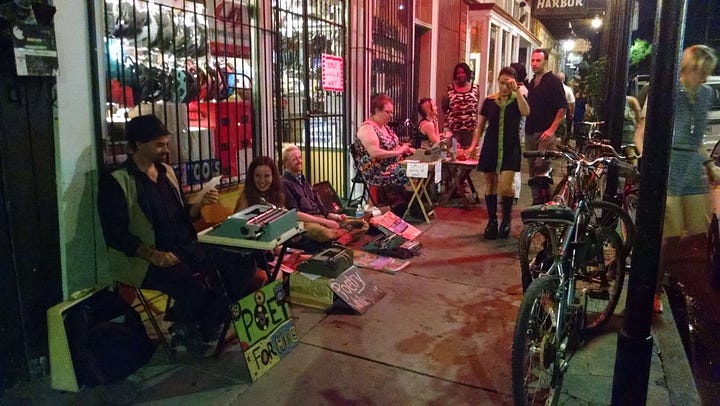
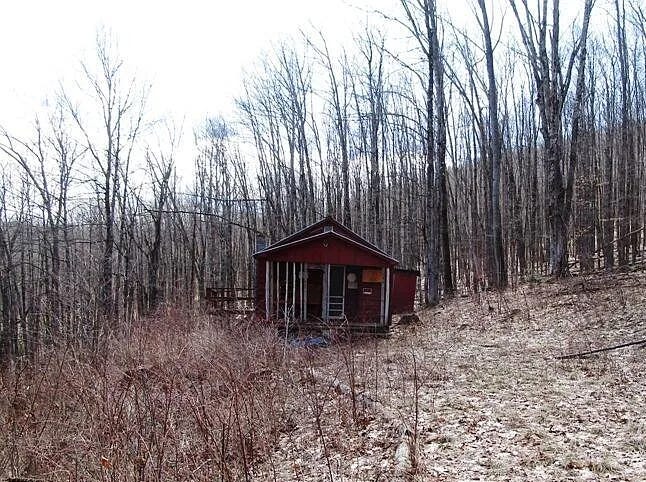
Always, it is best to frame one’s activities in terms that are legible to the ‘respectable’ folks where possible. Nomadic families ought to seem like “homeschooler families on a camping trip” rather than full-time nomads; settled homesteader types with close ties to the Amish and a plain manner of dress often slip under the radar, being dismissed as “Amish-type” people, and therefore free to do “Amish-like” things. Certain business may be best to leave un-mentioned to outsiders. The wisest course is to always imagine the visual reality of one’s life from the perspective of the “squarest” types of people imaginable — and to see to it that nothing about how things look would raise any alarms in such people. And at the same time, avoiding real paranoia is also paramount.
If one adopts a cautious disposition insofar as public image is concerned, stays true to their own nature, and keeps costs devilishly low — long-term success at sustaining a ‘drop-out’ status is readily plausible, even in multi-generational terms.
Time loses its meaning rapidly in such a life — whether one lives as a solitary vagabond, a cabin hermit, a homesteading family, or as a family of bus-dwelling nomads. What some Mexicans call “the Mañana Mentality” seeps in in mere months; for when one’s needs are simple and their life is cheap, there is seldom a reason to hurry towards anything. When wage work is irregular or unstructured, the mind can wander and get sidetracked; a fellow can take a siesta. A healthful idleness enters into the routine; but if one is not careful, such idleness can spread across one’s daily hours so extensively that it comes as a dangerous and paralyzing blight, or even poses a risk to sanity! Learning to have unlimited free time is a real skill that many Americans have no native intuition to learn; they must study it, practice it, even (ironically) work at it a little.
But this is, like “the default state of man,” a hurdle one must pass over and through for themselves. At the beginning, it is best to lean into the apparent endlessness of time; to stare out into space (preferably somewhere beautiful) infinitely until finally, the synapses snap on, and ambition rises in the heart and the body unprovoked. Though it may seem that this will never happen — I assure you, it does, so long as you have not succumbed to mindless entertainment, strong drink in excess, or endless traveling. When it happens, it is often simple: in seeing a strange bird, for example, one is enthralled by it, and its flight disturbs the endless yawn in time through which one is living. Then, it’s off to the library to search for the creature’s taxonomy and origin; and days later, one is suddenly an amateur ornithologist. And from ornithology, an interest in the birds of Siam might arise, and then in Siam itself, and then in British foreign policy regarding Siam, until finally one finds themselves poring over obscure British cookbooks and simmering boiled breakfast beans over their camp stove…
Others will find this kind of ‘wandering mind syndrome’ to be strange, but so long as one does not rush through it, it will become a kind of compass that guides a fellow through the unendingly blank schedule of his life. Those who adopt this as their practice will be well-pleased in the result: a life of curiosity, study, building, voyages, and a marvelous well-roundedness of mind.
Time’s impact, of course, does not only work upon the mind. Indeed, great hurtling chasms of time — taken alongside the kind of scenery that dropout types so famously tend to situate themselves in — will also work profoundly upon the spirit; and it is there that one might be able to appraise something of their reason for even “dropping out” in the first place. By this I mean: relieved from the pressures of bills and pay-stubs, removed from the grind and hustle of the commute, the “keeping up with the Joneses,” and from the synthetic environments in which the hoi polloi tend to reside — man is prone to meditating upon the marvels and beauties of his life, and indeed, he may be taken with thinking about God.2
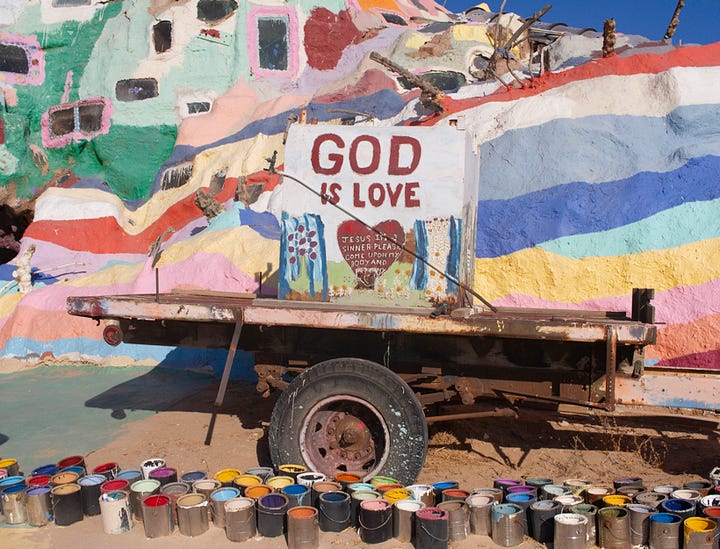
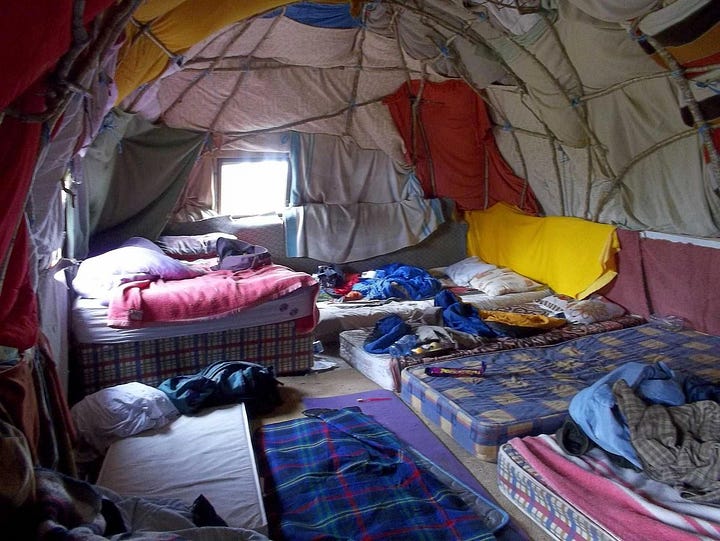


He will be bound, for example, to notice the peculiar abilities of mankind as compared with all of the other creatures he observes in the daily course of his life. And in reflecting on such an idea, he might come across some ancient Patristic text of the Christian faith, or even Scripture itself, claiming something to the effect of “man” being “made in the image of God.” Meanwhile, the fellow notices a peculiar connection between his relative poverty and his contentment; or he will see a man die somewhere along the road and feel something — or he will watch as the falcon snatches the trout with such elegance… and he will stare up in wonderment at the idea that this life of ours could possibly be only a random assemblage of particles and atoms in a Hobbseian race for evolutionary dominance and nothing more…
“Therefore, heed my words. Do not be concerned about your life and what you will have to eat or drink, or about your body and what you will wear. Surely life is more than food, and the body is more than clothing.
“Gaze upon the birds in the sky. They do not sow or reap or store in barns, and yet your heavenly Father feeds them. Are you not of far greater value than they? Can any of you through worrying add a single moment to your span of life?”
Matthew 6:25-27
For while the urge towards nomadism has not died, nomadism largely has; while man’s heart may insist upon freedom, there are now laws and cameras and an intensive suite of intricate, machinelike duties and requirements for citizens of our air-conditioned nightmare. Wilderness may be inscribed upon the heart of a man, but men themselves have shunned the wilderness, hiding from it. They hide from God also — for God is, like the wildlands He made, a timeless, indefatigable, ultimate reality; He and all that He has revealed and taught may ultimately hold the blinking, shimmering, shining world that modern man has constructed in complete and absolute Divine contempt.
It is only when the idle soul who has “dropped out” finds himself with a Bible in His hands, or slips into a Cathedral in a fit of unexpected curiosity — that he realizes he only wished to “drop out” of the mortal world of men and their endless web of anxious, soul-blackening sin. In this way, we find that the soul of the “dropout” is that of a living human being who only pines especially intensely for heaven in the end.
And so, though we may in our travels find ourselves in the company of the junkies and the hippies, the punks and the drifters, the criminals and the migrants — the ultimate arc points toward, after it all, keeping the company of the Saints. Only when one sets out on this maximal, final, flourish of a journey do they appreciate and see that among the old junkies and hippies and bums are there so many souls yearning to be Saints — but trapped in the bodies of broken human beings, tortured by cycles of sin.
If, then, a man’s quest might finally lead him to being seated in thunderstruck awe before the altar, kneeling with mouth agape before the Flesh and Blood of our Lord Jesus Christ; he has finally “broken through” to the heaven that he has ever sought. He stands before the mystical blueprint of heaven-on-earth; he is assured that he has not yearned for ever-greater freedom in vain. Far from juvenile witticisms about “the sheeple” who are “in the system” and so on and so forth; far from the vagabond’s blackout benders and nights in lockup — through all of that was one undying axiom that drove the fellow from the first first step he took: the idea that this world is damnable and sick. The dropout is, in his heart of hearts, only one tough, uncompromising, often solitary soul. He is hardened like a soldier, contemptuous like the punk, scrappy like the crackhead, built for survival, tortured by the hell of loneliness and grief; and he will follow his intuition and its inescapable judgement that there must be more in this life. There, he may well catch sight of Christ Jesus and be cleansed in an endless baptism of ultimate, final hope.
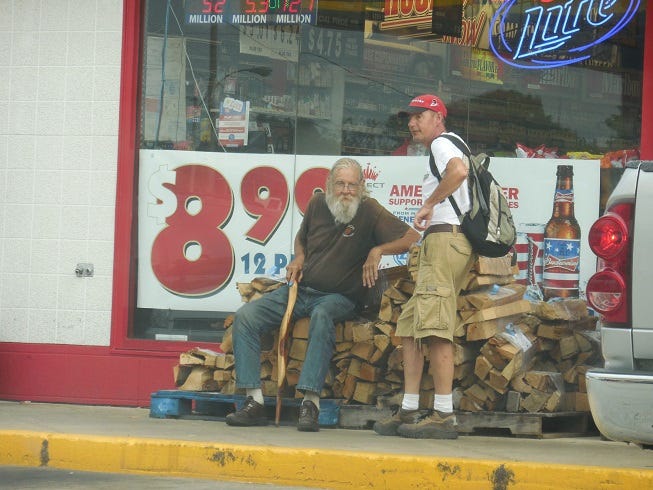

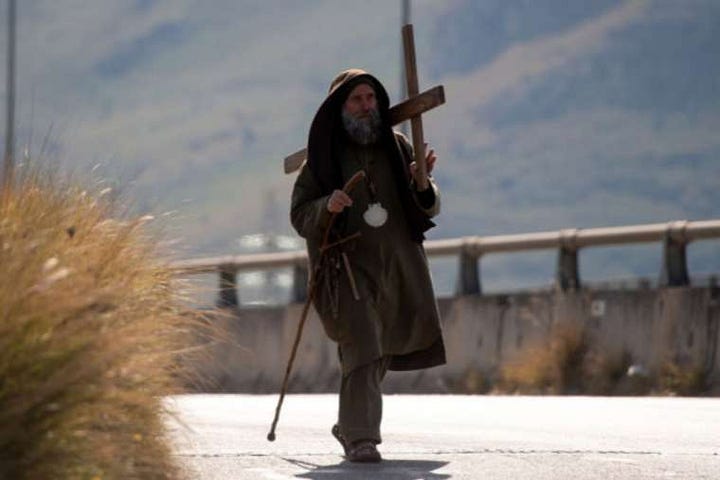
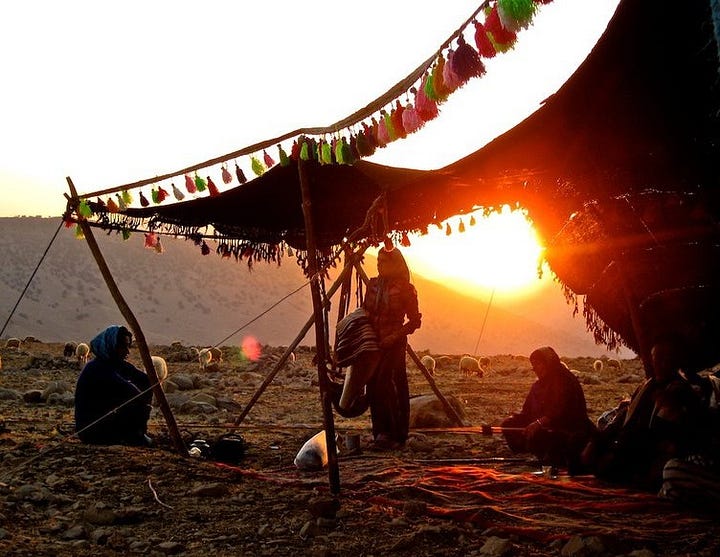
How, then, could the settled ones hold him in contempt? How could they chase him to the edges of the earth, to deprive him of everything, to wrest his children from his hands — even to murder him like Cain did Abel? For the erstwhile wanderer, the hippie, the baleful-eyed mountain man — are these not simply men whose soft, loving, desperate hearts have been covered in clouds of smoke or shields of armor, or hidden in the inaccessible deserts and jagged coastlines — covered by any defense mechanism they can conjure in order to slough off the constant painful reminders that the world is dead, fallen, wracked with darkness? Ugly as such people may seem now, we must remember that they may only be on one anguished step of a journey that will lead them straight to the hands of God Himself. And that, like monks without monasteries, they bear the weight of the world’s sins on their shoulders in their backpacks and rucksacks and far-flung mountain encampments…
So goes the cycle of life “outside;” so moves the heart of the peripatetics and nomads and frontier-seeking wildmen and their wild-eyed children. Theirs is a bloodline blessed by the Lord — whose Ever-Blessed Mother was in a state of flight on the night of His birth on earth; Lord who was born in a barn, whose people wandered the earth to proclaim His teachings. It is a race of human beings that shall go on forever; and if indeed, you are one of His — or are taken with the ways of His children; then go — do not hesitate.
What you will find will breathe life into you. The idle days, the desert sunrises, the incredible miracle of a plain bowl of rice — the smiles of your children as you fold the tents yet again to make for the winter encampment; the heavenly face of He who made all, leading you back to the very societies you “dropped out of” if only to share the peace you found “elsewhere” and by way of another kind of life.
If this is what is hidden behind every “like” on the social media posts about “living in a cabin in the woods,” why, I wouldn’t be shocked at all. For what heart has not hungered for heaven? What man or woman has not had a thought to take flight, to stray from the ragged flock, to make one’s life a living memorial to Old Ways that seemed all but extinct? Verily, many have had such a dream; and many will live it.3
For them — I’ll see you on the road. You are welcome at our camp anytime. Until then, go with God; stay light on your feet!
It is worth mentioning here that the dichotomy between “settled” and “nomadic” does not need to be so stark and absolute: it is certainly possible to purchase a series of cheap, isolated tracts of land, or to buy a string of cabins and cheap houses to travel between. This ‘hybrid’ between the two may actually be the strongest option for many; though it is not very common so far as I know, it could readily provide the best of both worlds.
I did not intend to make a religious essay out of this one, but truly, I had no choice.
Perhaps, if you’ve read this far, you’re asking yourself where the nuts-and-bolts, practical advice on “dropping out of society” is. That all might be for another essay, because so far as I know, the “tips and tricks” don’t matter much if you haven’t wrestled with the ideas I’ve laid out here. If you’d like to see that essay as a kind of Part Two to this one, please leave a comment and I’ll write it.



I do think you should write a part Two for those who have no understanding of the reality, in black and white terms, of living this way. Your current living arrangements, for many, is at the very "bottom," when in reality it is nowhere near there. I think those who want to drop out of society should know in great detail what that means. And you are the expert. Thank you for your knowledge and willingness to convey that knowledge.
I am 100% a sedentary dropout. Masanobu Fukuoka and Mark Boyle are my guides. Best wishes for you and the other nomadic dropouts.